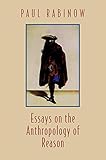Essays on the Anthropology of Reason / Paul Rabinow.
Material type: TextSeries: Princeton Studies in Culture/Power/HistoryPublisher: Princeton, NJ : Princeton University Press, [2022]Copyright date: ©1997Description: 1 online resource (216 p.)Content type:
TextSeries: Princeton Studies in Culture/Power/HistoryPublisher: Princeton, NJ : Princeton University Press, [2022]Copyright date: ©1997Description: 1 online resource (216 p.)Content type: - 9781400851799
- Ethnology -- History -- 20th century
- Intellectual life -- History -- 20th century
- Science and civilization
- Social sciences -- History -- 20th century
- SOCIAL SCIENCE / Anthropology / General
- Althusser, Louis
- Ambroselli, Claire
- Aristotle
- Augustine, Saint
- Bachelard, Gaston
- Banham, Reyner
- Bernard, Claude
- Bertillon, Alphonse
- Bourdieu, Pierre
- Brenner, Sydney
- Canguilhem, Georges
- Cantor, Charles
- Chakrabarty, Ananda
- Dagognet, François
- Deleuze, Gilles
- Descartes, René
- Eisenberg, Rebecca
- Elias, Norbert
- Feyerabend, Paul
- Flaubert, Gustave
- Gadamer, Hans-Georg
- Habermas, Jurgen
- Halbwachs, Maurice
- Heidegger, Martin
- Holtzman, Neil
- Jacob, François
- Jameson, Fredric
- Kant, Immanuel
- Krimsky, Sheldon
- Latour, Bruno
- Le Corbusier
- Lyotard, Jean-François
- Malinowski, Bronislaw
- Mauss, Marcel
- Ortner, Sherry
- Prost, Henri
- Rimbaud, Arturo
- Said, Edward
- Sarich, Vince
- Sartre, Jean-Paul
- Schaffer, Simon
- Sellier, Henri
- Sorj, Bernardo
- Strathern, Marilyn
- Tapper, Marion
- Washburn, Sherwood
- Watson, James
- Weber, Max
- Williams, Raymond
- Wilson, Allan
- Wittgenstein, Ludwig
- 306.4/2 20
- CB430
- online - DeGruyter
| Item type | Current library | Call number | URL | Status | Notes | Barcode | |
|---|---|---|---|---|---|---|---|
 eBook
eBook
|
Biblioteca "Angelicum" Pont. Univ. S.Tommaso d'Aquino Nuvola online | online - DeGruyter (Browse shelf(Opens below)) | Online access | Not for loan (Accesso limitato) | Accesso per gli utenti autorizzati / Access for authorized users | (dgr)9781400851799 |
Frontmatter -- Contents -- Preface -- Acknowledgments -- CHAPTER 1 Science as a Practice: Ethos, Logos, Pathos -- CHAPTER 2 Representations Are Social Facts: Modernity and Post-Modernity in Anthropology -- CHAPTER 3 On the Archaeology of Late Modernity -- CHAPTER 4 Georges Canguilhem: A Vital Rationalist -- CHAPTER 5 Artificiality and Enlightenment: From Sociobiology to Biosociality -- CHAPTER 6 Galton's Regret: Of Types and Individuals -- CHAPTER 7 Severing the Ties: Fragmentation and Dignity in Late Modernity -- CHAPTER 8 Steps Toward a Third Culture -- CHAPTER 9 American Moderns: On Sciences and Scientists -- Index
restricted access online access with authorization star
http://purl.org/coar/access_right/c_16ec
This collection of essays explains and encourages new reflection on Paul Rabinow's pioneering project to anthropologize the West. His goal is to exoticize the Western constitution of reality, emphasize those domains most taken for granted as universal, and show how their claims to truth are linked to particular social practices, hence becoming effective social forces. He has recently begun to focus on the core of Western rationality, in particular the practices of molecular biology as they apply to our understanding of human nature. This book moves in new directions by posing questions about how scientific practice can be understood in terms of ethics as well as in terms of power.The topics include how French socialist urban planning in the 1930s engineered the transition from city planning to life planning; how the discursive and nondiscursive practices of the Human Genome Project and biotechnology have refigured life, labor, and language; and how a debate over patenting cell lines and over the dignity of life required secular courts to invoke medieval notions of the sacred. Building on an ethnographic study of the invention of the polymerase chain reaction--which enables the rapid production of specific sequences of DNA in millions of copies Rabinow, in the final essay, reflects in dialogue with biochemist Tom White on the place of science in modernity, on science as a vocation, and on the differences between the human and natural sciences.
Mode of access: Internet via World Wide Web.
In English.
Description based on online resource; title from PDF title page (publisher's Web site, viewed 29. Jun 2022)


